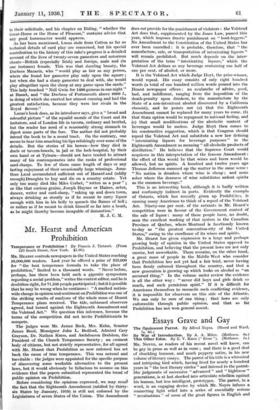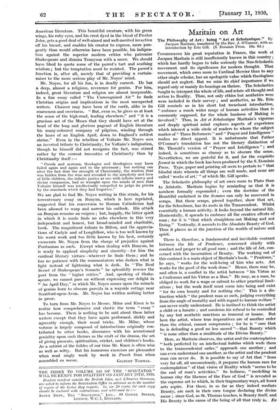Essays Grave and Gay
MR. NOYES, as readers of his recent novel will know, can be gay in prose as well as in verse ; and there is a good deal of chuckling humour, and much peppery satire, in his new volume of literary essays. The parrot of his title is a whimsical and intriguing bird which, having lived for nearly a hundred years in " the best literary circles " and listened to the parrot- like judgments of successive " advanced " and " highbrow " generations, is at last shocked into articulate rebellion against his human, but less intelligent, prototypes. The parrot, in a word, is an engaging device by which Mr. Noyes infuses a connecting light relief into a series of essentially serious " revaluations " of some of the great figures in English and American literature. This beautiful creature, with his green wings, his ruby eyes, and his crest dyed in the blood of Prester John, gets a good deal of well-aimed and well-merited invective off his breast, and enables his creator to express, more pun- gently than would otherwise have been possible, his indigna- tion against the superior modern critics who patronize Shakespeare and dismiss Tennyson with a sneer. We should have liked to quote some of the parrot's tart and scathing wisdom; but the temptation must be resisted. The parrot's function is, after all, merely that of providing a curtain- raiser to the more serious play of Mr. Noyes' mind.
Mr. Noyes, for all his fun, is in deadly earnest. He has a deep, almost a religious, reverence for genius. For him, indeed, great literature and religion are almost inseparable. In a fine essay called " The Unrecognized Air " he finds Christian origins and implications in the most unexpected writers. Chaucer may have been of the earth, alike in its coarseness and sweetness. " But, even so, he gives us at least the sense of the high-road, leading elsewhere," and " it is a gracious act of the Muses that they should have set at the head of the long and glorious pageant of English literature his many-coloured company of pilgrims, winding through the lanes of an English April, down to England's noblest shrine." Even in the rebellion of Voltaire Mr. Noyes sees an inverted tribute to Christianity, for. Voltaire's indignation, 'though he himself did not recognize the fact, was stirred rather by the current travesties of Christianity than by Christianity itself :— " Creeds and systems, theologies and theologians may have failed again and again and to the uttermost ; but nothing can alter the fact that the strength of Christianity, the wisdom that was hidden from the wise and revealed to the simplicity and love of little children, the infinite justice at one with infinite mercy and divine compassion, had so wrought upon the minds of men that Voltaire himself was intellectually compelled to judge its priests by the standards which they had forgotten."
We are glad to find Mr. Noyes writing in this strain, for his tercentenary essay on Bunyan, which is here reprinted, suggested that his conversion to Roman Catholicism had been allowed to warp and narrow his outlook. His attack on Bunyan remains an enigma ; but, happily, the bitter spirit in which it is made finds no echo elsewhere in this very independent and honest, but broad-minded and charitable, hook. The magnificent tribute to Milton, and the apprecia- tions of Carlyle and of Longfellow, who is too well known by his worst work and too little known by his best, certainly exonerate Mr. Noyes from the charge of prejudice against Puritanism as such. Except when dealing with Bunyan, he is ready to applaud simplicity and sincerity—for him the cardinal literary virtues—wherever he fords them ; and he has no patience with the commentators who darken what is light instead of lightening what is dark. In " The Real Secret of Shakespeare's Sonnets " he splendidly rescues the poet from the " higher critics." And, speaking of Shake- speare, we cannot pass on without expressing our delight in An April Day," in which Mr. Noyes muses upon the miracle of genius born to obscure parents in a wayside cottage near Stratford-upon-Avon. Mr. Noyes has written nothing better in prose.
To turn from Mr. Noyes to Messrs. Milne and Knox is to realize how comprehensive and elastic the term " essay " has become. There is nothing to be said about these latter writers except that they have again performed, slickly and agreeably enough, their usual tricks. Mr. Milne, whose volume is largely composed of introductions originally con- tributed to other books, discourses with his accustomed geniality upon such themes as the craft of the drama, the art of giving presents, spiritualism, cricket, and children's books. As a satirist of the foibles of our time Mr. Knox is often wise as well as witty. But his humorous exercises are pleasanter when read singly week by week in Punch than when







































 Previous page
Previous page